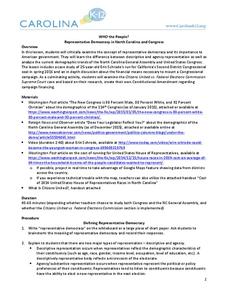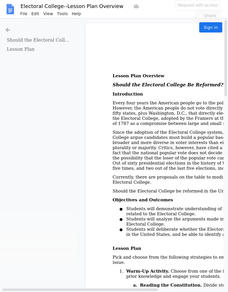Smithsonian Institution
Us vs. Them: The Chinese Exclusion Act of 1882
Immigration issues are nothing new. An interesting activity focuses on the racially motivated Chinese Exclusion Act of 1882 and its impact on the Chinese American community. Scholars read articles, analyze political cartoons, and...
Curated OER
Fighting for Democracy, Fighting for Me
Students consider how African American responded to social injustice. In this social injustice lesson plan, students compare and contrast the visions of Booker T. Washington and W.E.B. DuBois for obtaining civil rights for African...
Curated OER
Core Democratic Values of American Constitutional Democracy
High schoolers describe the ideas found in the core democratic values. In groups, they design and create a brochure explaining how the values relate to other ideas that Americans accept as a nation. They share what they know with with...
Curated OER
Fighting for Democracy, Fighting for Me
Students explore the contributions of African Americans, Japanese Americans, and Mexican Americans in World War II. In this World War II lesson plan, students research Internet and print sources regarding the treatment of the ethnic...
Curated OER
Democracy
Eleventh graders examine the denial of rights to individuals in the United States. In this American Government instructional activity, 11th graders study President Roosevelt's Day of Infamy speech. Students create a presentation on the...
Curated OER
The Road to Democracy
Eleventh graders examine the road to the American Revolution. In this American Revolution lesson, 11th graders read Thomas Paine's works and identify the issues that the colonists had with the British government.
Curated OER
The Jackson Inauguration: King Mob or Champion of Democracy?
Students examine and describe Andrew Jackson's 1828 inauguration, identify ways Jackson's election signaled important changes in American political landscape, discuss how Jackson embodied political culture of his era, and compare...
Carolina K-12
The Electoral College
Is the Electoral College the best method of electing the president of the United States? Your young historians will write a persuasive essay discussing the historical perspective of the college, pros and cons, and a final argument for or...
C-SPAN
Why Do Americans Not Vote in Elections?
In an age of inflamed politics, who votes, who doesn't vote, and why are the questions everyone is trying to answer. Pupils listen to scholars, journalists and data crunchers on voting statistics to make their own conclusions. A chart...
Curated OER
The Brief American Pageant: The Rise of a Mass Democracy
Focusing on the 1828 election of Andrew Jackson, the removal of Southern Native American tribes (Trail of Tears), and the Texas Revolution, these three slides are full of good information for your lecture. Though brief, the maps featured...
Carolina K-12
Who the People? Representative Democracy in North Carolina and Congress
Our elected officials are supposed to represent us, but what does it mean when they aren't like us? Budding citizens explore the demographic makeup of the US Congress, the role of money in political elections, and the Citizens United...
Center for Civic Education
What Does Returning to Fundamental Principles Mean?
Looking for materials for your Constitution Day and Citizenship Day lessons? Then check out this packet of activities that not only gets your class members thinking critically about the fundamental principles at the heart of American...
Curated OER
Unit 1: Building Historical Background Knowledge: The Road to Revolution 1754–1776
What were the conditions that led to the American Revolution? What are the conditions that lead to revolution in other times and places? Class members examine primary source materials and use evidence drawn from these documents to craft...
Curated OER
Democracy…Not Yet!
Students analyze the concept of democracy. For this democratic values lesson, students analyze the lyrics of selected popular music that address issues that challenge the role of United States as a world leader. Students create exhibits...
National Endowment for the Humanities
Common Sense: The Rhetoric of Popular Democracy
Students identify important arguments for independence made in Thomas Paine's Common Sense. They explain why these arguments helped persuade American colonists that independence was necessary. Students describe the importance of Common...
Curated OER
The Right Choice
Students examine the leadership role of George Washington in the American Revolution. In this George Washington activity, students read selections titled "Generalship," and "Candidate for Commander-in-Chief." After students read the...
DocsTeach
The Civil Rights Act of 1964 and the Equal Employment Opportunity Commission
1964: A victory for the civil rights movement! Scholars read a section of the Civil Rights Act of 1964 and discuss what affirmative actions means to them. The resource is a jigsaw activity, with each group focusing on one section of the...
National Woman's History Museum
Fannie Lou Hamer and Social Activism
Not all heroes wear capes. An impactful lesson plan focuses on the life and activism of Fannie Lou Hamer during the civil rights movement. Scholars read her speeches and other material, participate in group discussion, and complete a...
Curated OER
The Articles of Confederation (1781-1789)
In this online interactive history worksheet, learners respond to ten short answer and essay questions about the Articles of Confederation. They may check some of their answers on the interactive worksheet.
Judicial Learning Center
The Judge and the Jury: Trial by Jury
Why is it so important to have a trial by jury in the American judicial system? This right is one of the hallmarks of American democracy, but it also comes with the responsibility of serving on a jury if called. Young legal scholars...
C-SPAN
Electoral College
Most people are surprised to learn that American democracy is not as direct as they thought. Using a package of guiding questions, charts and curated videos, learners unpack the unique American institution of the Electoral College. The...
State Bar of Texas
White v. Regester
One vote doesn't really matter, right? Class members investigate the concept of voter rights and restrictions using the 1973 Supreme Court case White v. Regester. They view a short video and work in pairs to analyze how people create...
National Endowment for the Humanities
A Defense of the Electoral College
Each presidential election year, the debate about the electoral college rages. Michael C. Maibach's "A Defense of the Electoral College" offers young political scientists an opportunity to examine a reasoned argument for why the...
Curated OER
Strengthening Democracy In Latin America
Students consider how to strengthen democratic principles in Latin America. In this government systems lesson, students explore the challenges to democratic forms of government in Latin America as they examine primary sources. Students...
Other popular searches
- Roots of American Democracy
- Basis of American Democracy
- Origins American Democracy
- Early American Democracy
- Native American Democracy
- Analyze American Democracy

























